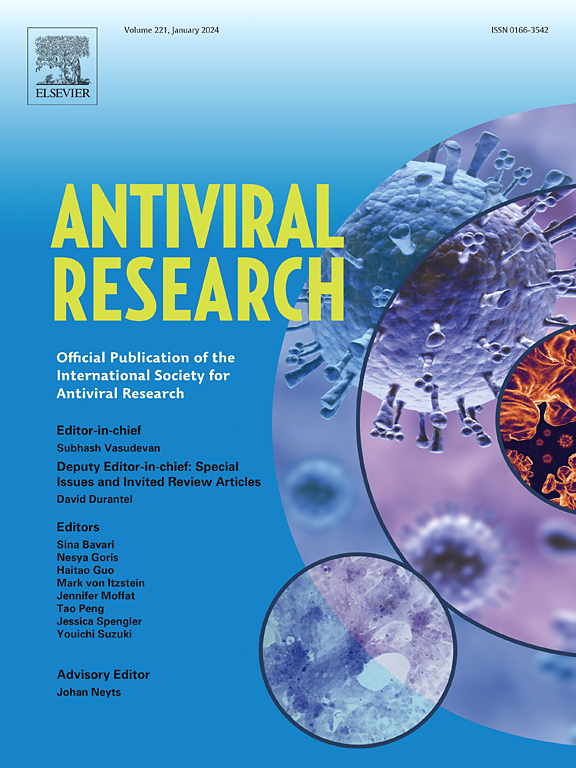重组单纯疱疹病毒介导的 CRISPR/Cas9 递送靶向药物对 HPV16 阳性宫颈癌的抗肿瘤疗效。
IF 4.5
2区 医学
Q1 PHARMACOLOGY & PHARMACY
引用次数: 0
摘要
宫颈癌通常是由 HPV16 或 HPV18 等高危人乳头瘤病毒(HPV)感染引起的,它仍然是癌症相关死亡的主要原因。约 90% 的宫颈癌患者体内都发现了 HPV16,它携带的关键致癌相关基因(E6、E7、E2、E5)和上游调控区(URR)有助于癌症的发展。本研究采用一种名为 SONC103 的重组单纯疱疹病毒 1 型(HSV-1)与 CRISPR/Cas9 基因编辑系统相结合的新方法。目的是靶向破坏宫颈癌细胞中整合的HPV16基因。结果表明,SONC103 能够特异性地有效敲除 HPV16 致癌基因,从而减少细胞增殖并促进细胞凋亡。分析进一步揭示了感染细胞染色体中HPV16 DNA探针的缺失、与肿瘤凋亡相关的细胞过程的显著调节、E6/E7肿瘤蛋白的下调以及肿瘤抑制蛋白P53和pRB的增加。值得注意的是,SONC103 在小鼠异种移植宫颈癌模型中表现出对肿瘤生长的显著抑制作用。这项研究展示了重组溶瘤HSV-1病毒(SONC103)通过靶向癌基因和促进溶瘤来抗击HPV16阳性宫颈癌的潜力。本文章由计算机程序翻译,如有差异,请以英文原文为准。
The anti-tumor efficacy of a recombinant oncolytic herpes simplex virus mediated CRISPR/Cas9 delivery targeting in HPV16-positive cervical cancer
Cervical cancer, often driven by high-risk human papillomavirus (HPV) infections such as HPV16 or HPV18, remains a leading cause of cancer-related deaths. HPV16, found in about 90% of cervical cancer patients, harbors key oncogenic related genes (E6, E7, E2, E5) and an upstream regulatory region (URR) that contribute to cancer progression. This study introduces a novel approach using a recombinant oncolytic herpes simplex virus type 1 (HSV-1) named SONC103, armed with a CRISPR/Cas9 gene editing system. The aim was to target and disrupt integrated HPV16 genes in cervical cancer cells. Results demonstrated SONC103's capability to specifically and effectively knock down HPV16 oncogenes, thereby reducing cell proliferation and promoting apoptosis. Analyses further revealed loss of HPV16 DNA probes in infected cells' chromosomes, significant regulation of cellular processes related to tumor apoptosis, and downregulation of E6/E7 oncoproteins while increasing tumor suppressor proteins P53 and pRB. Notably, SONC103 exhibited substantial inhibition of tumor growth in a murine xenograft cervical cancer model. This study showcases the potential of the recombinant oncolytic HSV-1 virus (SONC103) in combating HPV16-positive cervical cancer by targeting oncogenes and facilitating oncolysis.
求助全文
通过发布文献求助,成功后即可免费获取论文全文。
去求助
来源期刊

Antiviral research
医学-病毒学
CiteScore
17.10
自引率
3.90%
发文量
157
审稿时长
34 days
期刊介绍:
Antiviral Research is a journal that focuses on various aspects of controlling viral infections in both humans and animals. It is a platform for publishing research reports, short communications, review articles, and commentaries. The journal covers a wide range of topics including antiviral drugs, antibodies, and host-response modifiers. These topics encompass their synthesis, in vitro and in vivo testing, as well as mechanisms of action. Additionally, the journal also publishes studies on the development of new or improved vaccines against viral infections in humans. It delves into assessing the safety of drugs and vaccines, tracking the evolution of drug or vaccine-resistant viruses, and developing effective countermeasures. Another area of interest includes the identification and validation of new drug targets. The journal further explores laboratory animal models of viral diseases, investigates the pathogenesis of viral diseases, and examines the mechanisms by which viruses avoid host immune responses.
 求助内容:
求助内容: 应助结果提醒方式:
应助结果提醒方式:


